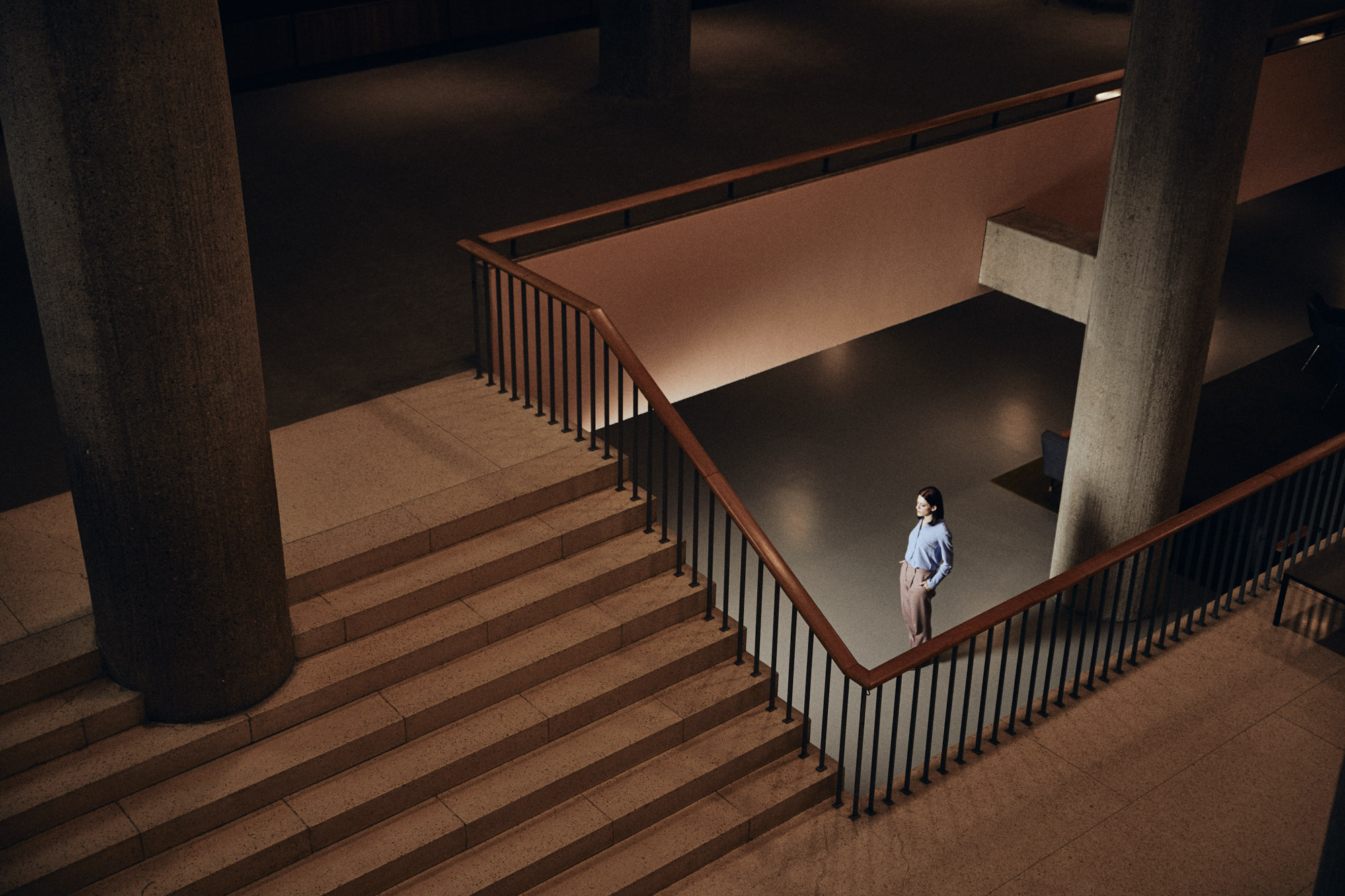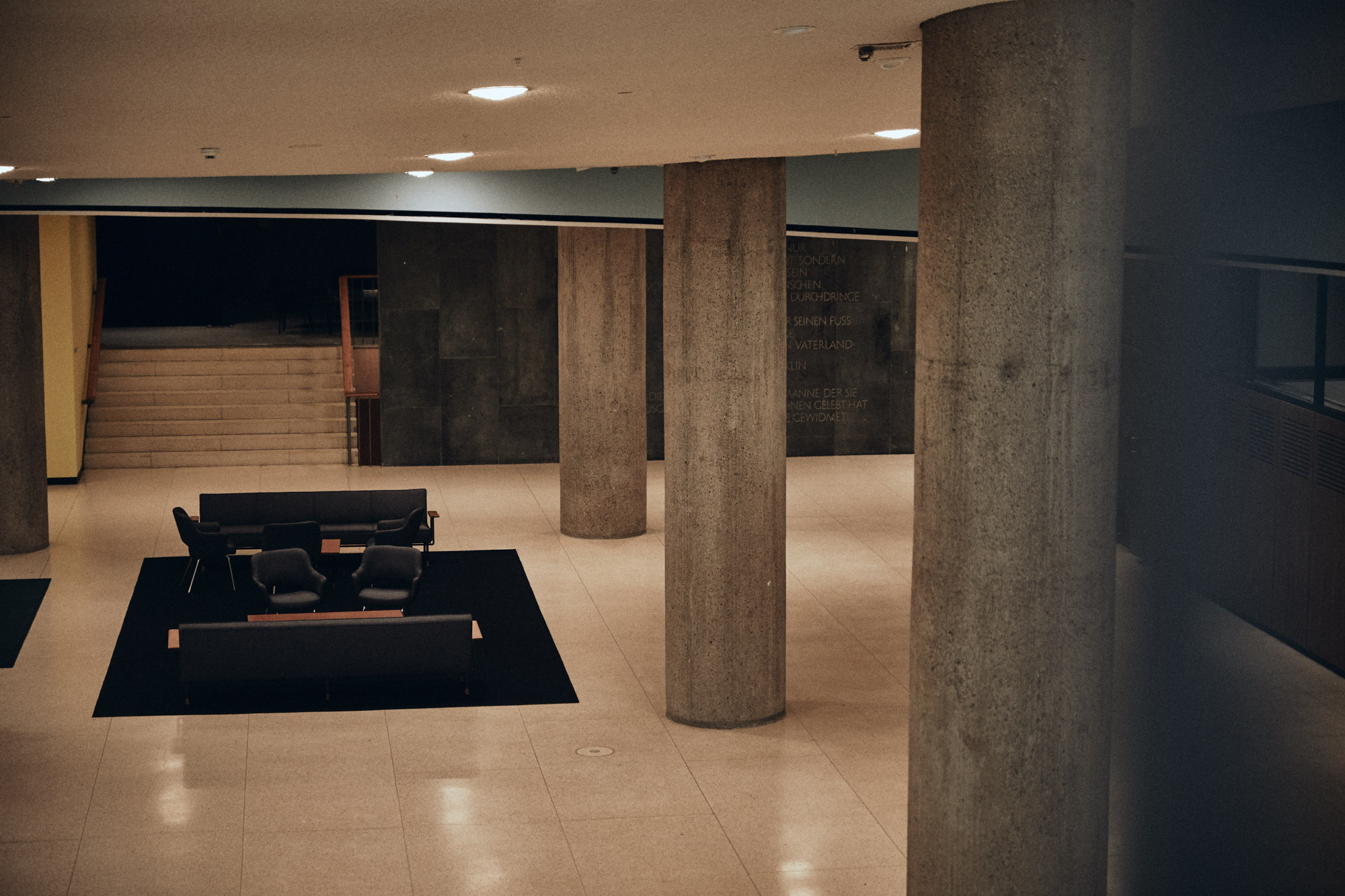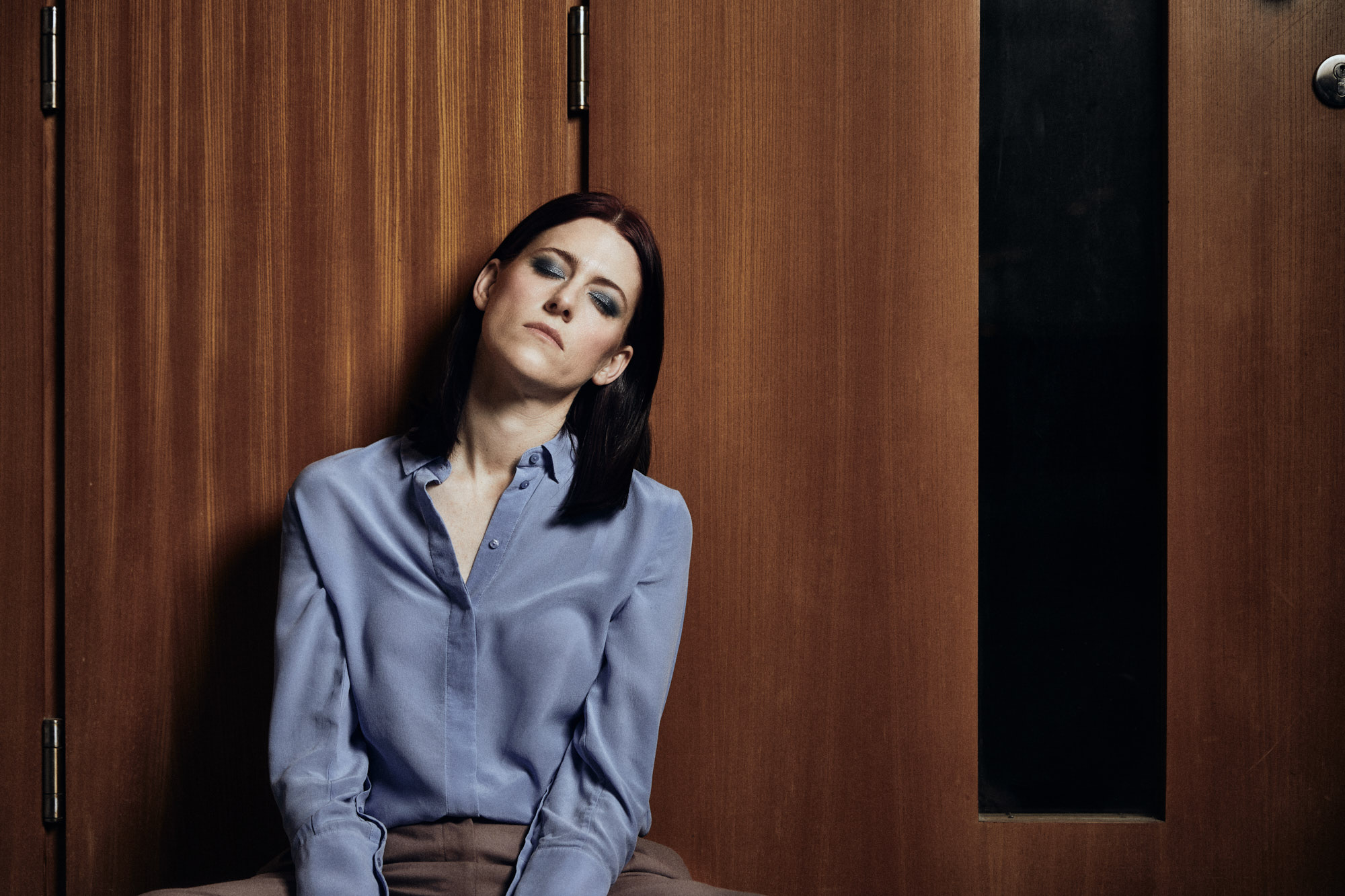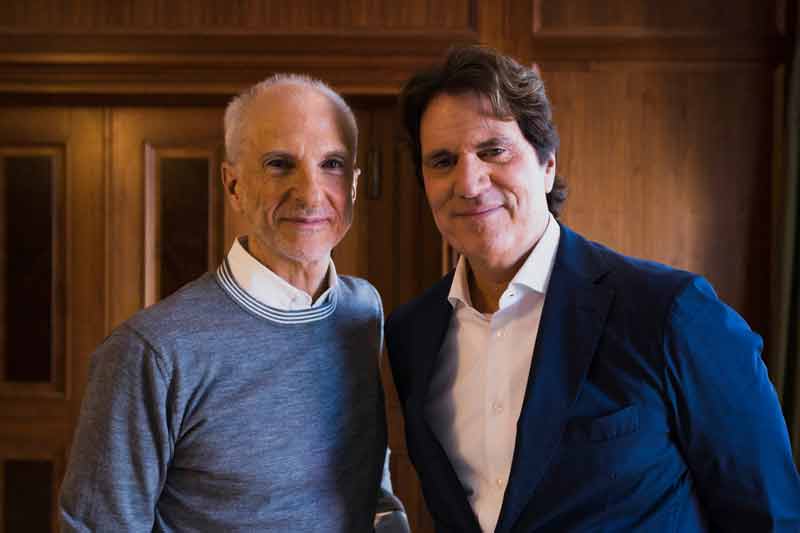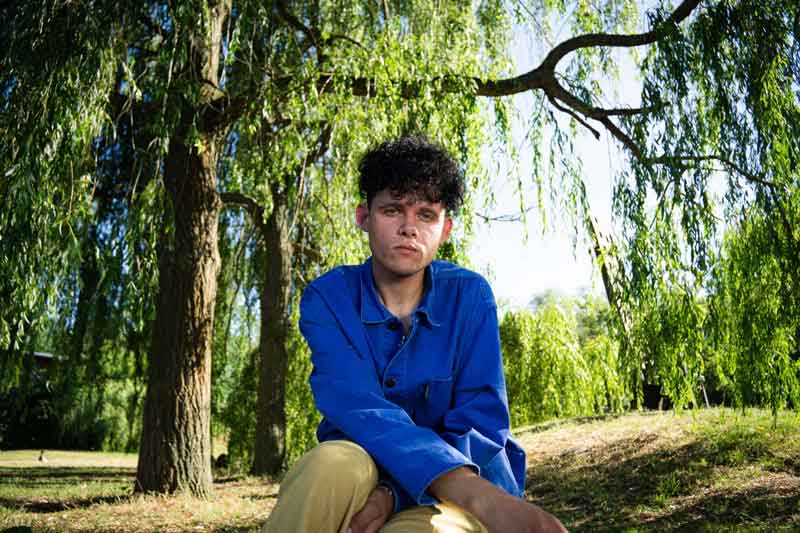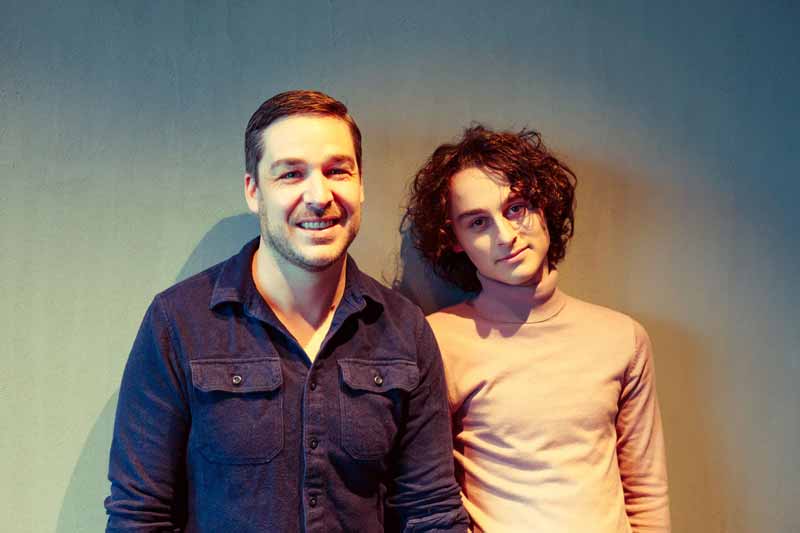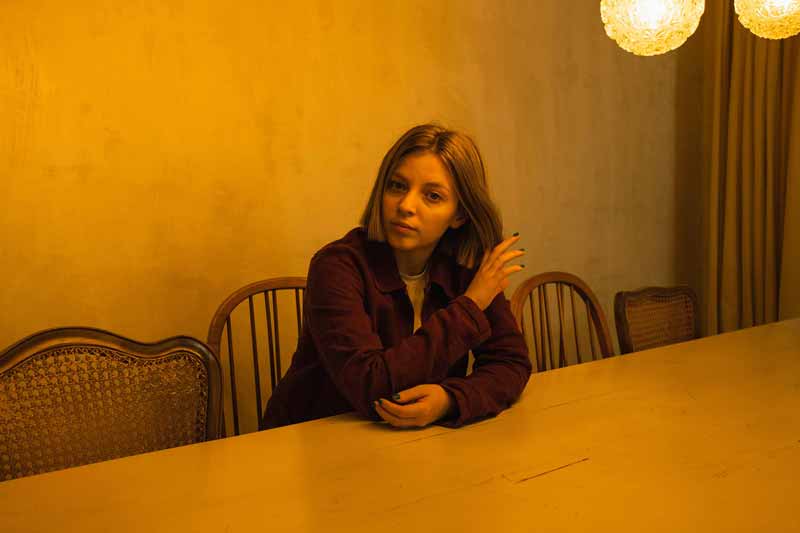Interview — Kat Frankie
Being Obnoxious
With her new record, singer-songwriter Kat Frankie doesn’t want to sound melancholic anymore, but rather happy and obnoxious. In our interview, she tells us why she plays the role of a referee in a music video, how come the story of an amateur cage-fighter inspired her to write a song and why she doesn’t like to publish her lyrics.
30. Januar 2018 — MYP N° 22 »Resistance« — Interview: Jonas Meyer, Photography: Steven Lüdtke
It’s one of those days when you’re reminded how bad the combination of winter and Berlin actually is. Grey skies up above, wet ground down below—the freezing cold right in between. So many better places to be at the moment—like Australia for example.
Kat Frankie, born and raised in Sydney, actually did chose Berlin though and voluntarily stays here. In fact this year marks her 14th winter in Berlin. The singer-songwriter left her homeland in 2004 and has since been making a name for herself here. Not only has she released three albums, Kat has also dedicated her time to various successful side projects. Throughout the years, Kat Frankie has collaborated with different notable personalities of the German music scene such as Olli Schulz, for whom she played the guitar, or Get Well Soon aka. Konstantin Gropper, with whom she composed the soundtrack for the talk show „Schulz und Böhmermann“. She also sang a duet with Clueso and co-founded—with Chris Klopfer—the music project Keøma that took part in the 2016 preliminaries of the Eurovision Song Contest.
This February, Kat Frankie’s fourth album is about to be released and it is titled “Bad Behaviour”. She tells us that this time around, she didn’t want her record to sound so melancholic and instead went for more of a happy and “obnoxious” sound. What exactly she means by that is among the questions we asked her when we met Kat for our interview in the HKW, the Haus der Kulturen der Welt in Berlin.
Jonas:
A couple of weeks ago, you released the single “Bad Behaviour” one of ten songs on your new record. For you, this track isn’t completely new—you’ve been carrying it with you for quite a while. How did the song come to you and how did it grow up?
Kat:
A long time ago, I behaved pretty badly, which made me feel awful and so I wanted to write a song about it. I think it took such a long time to create the song—and the new album for that matter—because I’ve constantly been doing other things on the side: I have another band called Keøma, and was also playing guitar for Olli Schulz, along with other stuff too. So this song has just been with me for a while. But I did always know it would be the first song on the new album. I really like pop songs with darker lyrics. There’s a song “Walking On Broken Glass” by Annie Lennox that is a really happy pop song, but the lyrics are quite dark. She has this line “I’m living in an empty room / With all the windows smashed” and you think: Holy shit, that’s heavy! So for me, the thing I like about “Bad Behaviour” is that it actually sounds like a pop song, but the lyrics are quite aggressive.
Jonas:
What makes this song so personal and so profound for you?
Kat (considers for a moment):
I mean every song of mine—even if it’s not about me—is obviously a little autobiographical. When you write music, you add your perspective, you add your ideas. And once you express an idea, you’re putting yourself into it, just because it’s you who’s making it. Sure, you can write stories about other people, but you also have to choose how you tell that story. And that’s where the connection with the artist comes in. But “Bad Behaviour” is just a classic “being-badly-behaved-in-a-relationship” kind of song.
»In relationships, it’s all fun and games until someone gets hurt.«
Jonas:
“Relationship” is a good keyword: The music video for “Bad Behaviour” shows different couples in a boxing ring, fighting each other with pillows. During the first seconds of the clip, we can see you playing the role of the referee. Are you explaining the rules of relationships—the rules of how to deal with each other?
Kat (laughs loud):
A little bit, yeah. I mean that’s the idea of the video. It’s a metaphor, obviously, for relationships: In relationships, it’s all fun and games until someone gets hurt. And yes, I guess I have more of a referee role in the video, trying to get the fighters to play fairly.
Jonas:
I think we have something in common: In 2011, I met music artist Chris Klopfer. I saw him playing in a small bar in Neukölln and after his concert, I asked him if he could imagine contributing to our magazine with a self-written article because I liked his music so much. I heard you met him in 2011, as well. Together you guys founded this common music project called Keøma, which you’ve talked about. How does making music with Chris work?
Kat:
Working with Chris is very easy. He’s the ideas’ man, he’s filled with lots of little hooks and concepts. Keøma started when Chris asked me to help him finish a song he was working on. We just recorded it at my house and it was all so easy. After that, he asked me: “Can you also help me work on another song?” And that went really well too. And then there was a third song and a fourth. And another. A year and a half later, we had an album. It was the first time I had really collaborated with someone. I’d been a solo singer-songwriter for so many years before then, and suddenly there was a chance to work with somebody else, to produce music that wasn’t the music I usually put out. It really was a chance to play around, to experiment and to not take anything too seriously—to just see what happens. And what happened was that we ended up with a really nice album.
Jonas:
I remember Chris’ concert in that tiny bar in Neukölln very well. There were a couple of rude people, being noisy, making fun of the lyrics. Then Chris jumped on a chair and an older guy started laughing at him. I thought: What a prick, just be quiet! Have you experienced similar situations when you’ve played concerts in bars and tiny clubs, especially during your first few months in Berlin?
Kat:
I have to disappoint you. I think I had it really easy when I came to Berlin. I was very lucky because I found a nice community here that was really, really open to outsiders and very helpful. I actually played in a lot of cafes and a lot of bars for many years when I first came here, but I never had to fight with rude people for attention. Everyone was very supportive in Berlin, which is why I kept going, and which is why I still live here—It’s still such a supportive environment for me.
»Nobody really chooses or prefers to play in cafes. You’re competing with the coffee machine, you’re competing with the waiter, you’re competing with the door.«
Jonas:
Are small bars and cafes the best environment for singer-songwriter music? For me, your music feels very “nahbar” as we say in German, and small bars and cafes can mostly offer a suitable intimate space for that.
Kat:
To be honest: Nobody really chooses or prefers to play in cafes. You’re competing with the coffee machine, you’re competing with the waiter, you’re competing with the door that opens and closes every second… it’s tough! Every singer-songwriter who’s starting out and spends years in that world is trying to get more attention and is trying to play for more than 20 people. In one sense it’s lovely to have the intimacy, but it’s also kind of limiting because it only allows one kind of performance. The specific cafe environment is more for a quiet, intimate, almost melancholic kind of music. But if you want to explore different kinds of music, it doesn’t really work there. I mean no rapper ever did his time performing in cafes. It’s really something that is kind of a singer-songwriter cliché. I like playing for bigger crowds and, by the way, I’m not so good with eye contact. So cafes are just something that is necessary.
Jonas:
In the last few years, you’ve worked with a lot of different wonderful music artists. What comes to your mind when you think of Olli Schulz for example?
Kat (smiles):
Olli Schulz has no filter, that’s what makes him great—and what makes people love or hate him. He’s crazy and chaotic, and there’s part of me that admires a man who can just say what he thinks without considering the consequences. It’s really fun to hang out with Olli.
Jonas:
And when you think of Francesco Wilking?
Kat:
Oh Francesco! He’s just a beautiful lyricist, I would say the best in Germany—put me on the record for that! Francesco is like a classic sensitive tough guy and incredibly talented. I love him.
Jonas:
Get Well Soon aka. Konstantin Gropper?
Kat:
Konstantin Gropper is very funny and quite dry, he’s got a very good sense of humor. And he wears suits everywhere, I really like that.
Jonas:
Clueso?
Kat:
Clueso is also quite special. How do I describe Clueso? When I met him, I was expecting a “classic-mainstream-pop-studio” kind of guy—and what I discovered was someone who is constantly creating, constantly writing, and constantly trying to make better music. I was quite surprised by that. He’s actually a really hard worker. And he’s a good live-performer, who knows how to entertain 3.000 people.
»I was singing before I could talk.«
Jonas:
And Kat Frankie—the person that sings with you in some of your songs?
Kat (laughs loud):
Kat Frankie probably is a bit extreme and over the top at times… for some people. She likes drama in her music and tries not to be afraid to express that.
Jonas:
Since you were a little kid, the technique of using a loop machine and multiplying your own voice has been a way to make music. Would you say you’re completely familiar with your own voice? Or does it happen from time to time that this voice still surprises you?
Kat:
The funny thing about singing is that it doesn’t come from your throat, it comes from your body. Your head resonates, your body resonates, it’s a very physical sensation—I think people forget that singing is very much a physical activity. I know my voice like people know their right hand. I don’t have much more to say about that, there’s nothing that surprises me. I was singing before I could talk.
Jonas:
In 2016, you said: “People that write sad songs are a little happier.”
Kat:
Yeah, that’s true.
Jonas:
And in the press kit I got for the interview, you say that with your new record “Bad Behaviour”, you didn’t want to be so melancholic anymore…
Kat (laughs):
So I’ve become more depressed—is that what you want to say?
Jonas:
No, I hope not! But what is the reason behind this decision?
Kat:
I spent a lot of time being a very… (disguising her voice) “ernsthafte” musician.
Jonas:
A very German word.
»This melancholy thing, I’ve just done it too much. Creativity isn’t about repetition; creativity’s about challenging yourself.«
Kat:
Yes, “ernsthaft”! And “authentisch” and “melancholisch”. But I feel like it’s too easy to be melancholic. For me, it’s much harder—incredibly hard—to write a happy song because happy songs often sound superficial and kind of meaningless. That’s something I’m still working on. This melancholy thing, I’ve just done it too much. In my opinion, creativity isn’t about repetition; creativity’s about challenging yourself. And by the way, I just had happier things to say and I felt a bit more confident with that this time around.
Jonas:
To describe your new record, you use a very interesting word: Obnoxious.
Kat:
Oh, that’s my favorite word!
Jonas:
What makes this album obnoxious?
Kat:
There’s a song on it, “Headed For The Reaper”, that goes: (imitating trumpets)… That’s what obnoxious is about: This attitude of “I don’t care if it’s nasty, I gonna do it anyway.”
Jonas:
It’s hard to find a German translation of this word.
Kat:
It’s impossible! I wish there was one.
Jonas:
Maybe “anstößig”?
Kat:
Hmm, I don’t know. You can interpret it as kind of being a jerk, but it’s not really being a jerk, it’s more like having an intention. It’s a tricky word. Sorry.
Jonas:
“Headed For The Reaper” goes back to a story, which you read in the New York Times years ago. It’s about an amateur cage-fighter who owed drug money, faked his death and then bungled a robbery. Why did you feel the need to make a song out of this?
Kat:
Because it was such an amazing story of the oddest stupidity—it was so beautiful! And, I think I just really loved the detail of him being called “tomato can” because he was so bad at cage-fighting. It made me so happy to read that. And I loved that the story was so dark, I just had to write about it.
Jonas:
Sounds like a perfect topic for Olli Schulz’ funny “Big Five” rankings on his Fest & Flauschig podcast on Spotify: “The big five stories of oddest stupidity”.
Kat:
It’s true, actually!
»So much nasty shit has been happening, so I had to express that. I don’t usually write things about politics or society, but it’s got to come out somehow.«
Jonas:
There’s another song on your new record called “Home”. It’s an up-tempo track and full of energy. Apparently, you wrote this song because you were very angry? What kind of anger was it?
Kat (groans):
Well, I think I was having a bad week. I was reading the news and I was just getting very hateful. There were the “Black Lives Matter” protests happening in the U.S., there was the gay marriage debate in Germany—a debate that we also had in Australia—with very hurtful and offending comments and unpleasant discussions. I just thought: So much nasty shit has been happening! And it’s still happening right now. So I had to express that and I feel like it comes down to people that want to control the lives of others because they’re scared. I don’t usually write things about politics or society, but I’m a songwriter and it’s got to come out somehow. And the new record is how it came out.
Jonas:
You have the habit of not publishing your lyrics. Is there a special reason for that?
Kat:
I think that once lyrics are published as a text, they are no longer part of the song. I like the idea that words and music exist together as sound waves and that this is the only way you can experience a song. And I also like that, when people listen to songs and they don’t know the words, they make different connections in their heads or they invent new words that aren’t actually the correct ones. In this case, you’re interacting much more with a song than if I told you the correct words. When you remove the text from a song, I think it would become more of a two-way-interaction with the music. Honestly, if I wanted to publish text, I would write poetry—and I wouldn’t put it with a song. But combining the two, that’s what musicians do.
Hair & make-up: Natalia Soboleva
